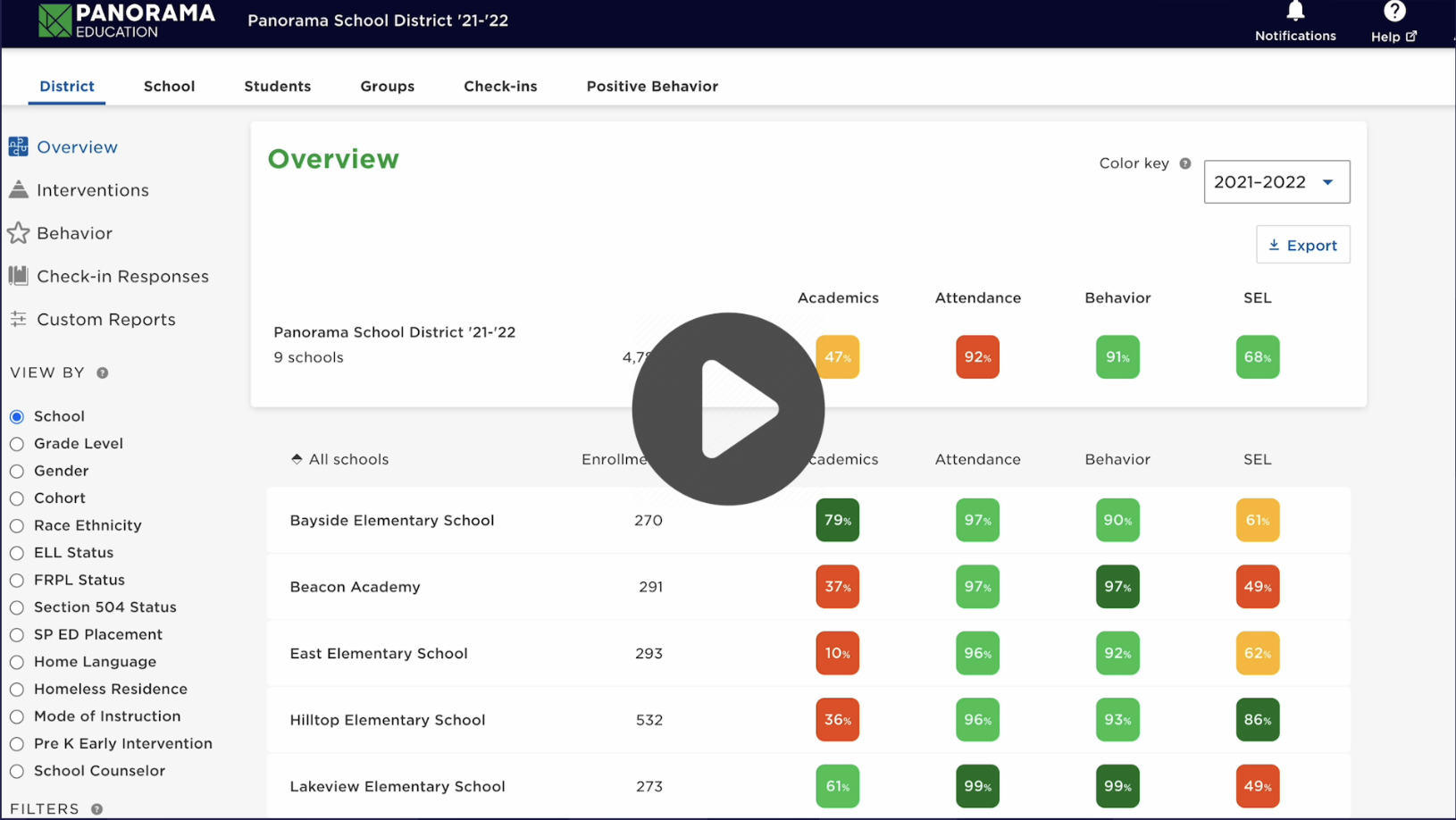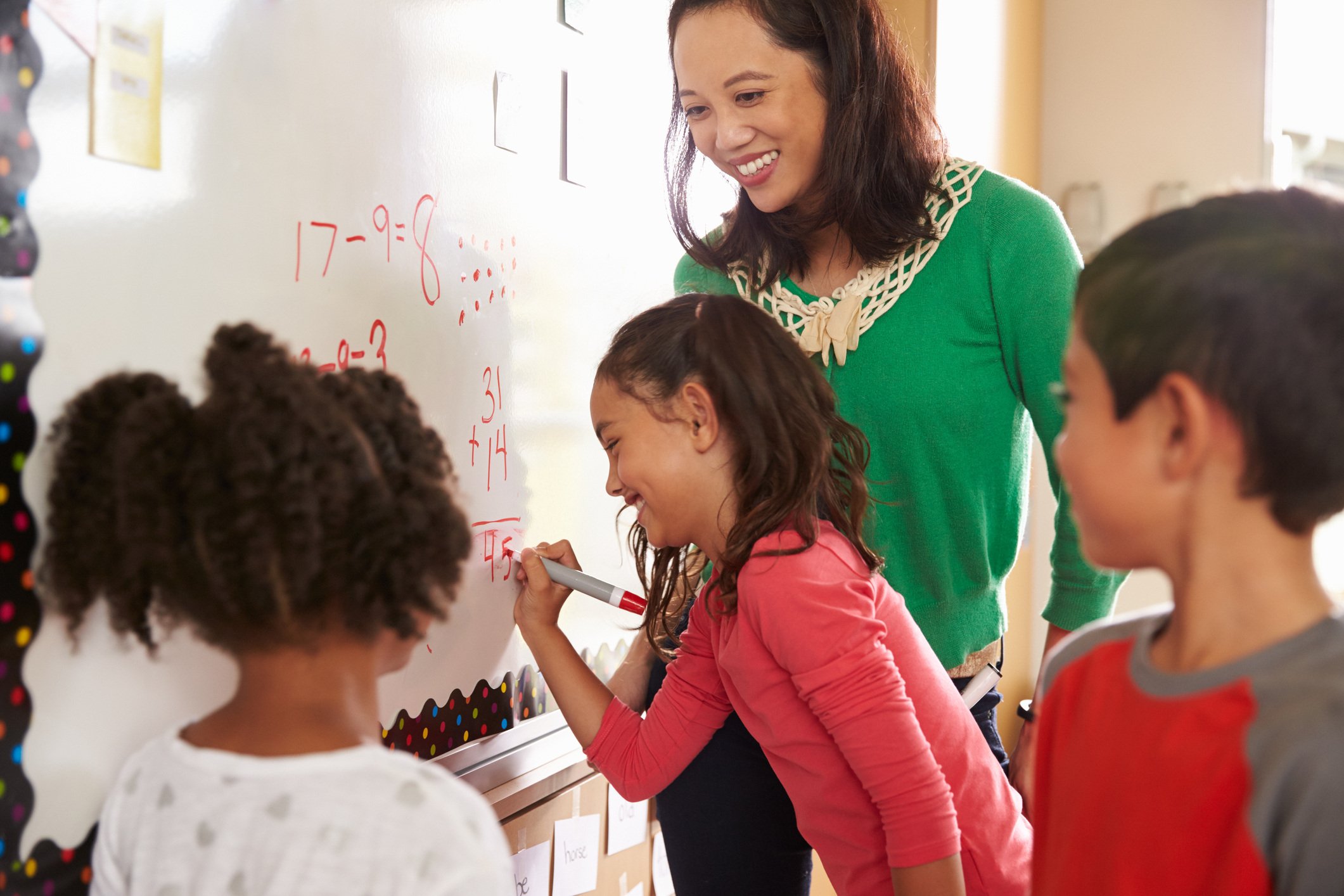As an educator, you know the power of a good plan. From lesson plans to transportation routes to lunch menus to assessment schedules, districts run because of well-constructed plans.
So when it comes to building and sustaining your district’s Multi-Tiered System of Support (MTSS), you will of course need a plan.
When implemented with fidelity, MTSS can be a powerful way to ensure every student gets what they need. But committing to this framework can seem complicated, overwhelming, or downright impossible.
That’s why we’ve outlined the six key components of successful MTSS implementation. Whether you are just getting your MTSS off the ground, recommitting to practices after a disruption, or wondering where to go next, this guide will help you build and strengthen your district's MTSS.
|
Watch a quick preview of how you can level up your MTSS with Panorama Student Success |
The 6 Key Components of a Strong MTSS Implementation Plan
1. Set Clear Goals
Goal-setting is an important part of any planning process: you need to have a clear idea of where you want to go to decide the steps needed to get there. When setting goals for your MTSS implementation, consider the following:
- Keep goals small, specific, and achievable.
- Aim for 1-3 goals per year.
- Ensure that they are aligned with your district’s priorities.
- Determine what success will look like for each goal, and how you will track progress.
- Make a plan for continually supporting work on this goal throughout the year.
Different stages of MTSS require different types of goals. Here are some examples:
- If you are getting started with MTSS: Your goal could be to “establish an MTSS team by the end of the school year.” You can develop an action plan around how to establish your MTSS team, what their duties will be, and what a meeting schedule will look like.
- If you are recommitting to your MTSS: Consider goals around gathering feedback to determine student needs, or strengthening Tier 1 supports. A solid Tier 1 foundation is critical to rebuilding your MTSS.
- If you are several years into your MTSS: Set goals around responding to teacher and student feedback, or implementing other systems within your MTSS. Now that you have a solid foundation, are there opportunities to strengthen your SEL curriculum or Positive Behavioral Interventions and Supports (PBIS) within your MTSS?
Recommended Resource: Year One of MTSS: Tips for Getting Started
2. Build Buy-In Across Your District
Kimberly Lawson, Director of Special Education at Special School District in Mehlville, MO, shared powerful insights on her district’s approach to building buy-in for MTSS:
“MTSS work needs to start at the central office in order to be implemented district-wide, and building-level teams need extra support during the first few years…Ensuring our buildings were supported was one of the best decisions that we made as a team. Any way that districts can figure out how to coach and how to support, they should.”
District leadership and involvement is an essential part of successful school-level MTSS implementation. When you have buy-in from your leadership team, resources can be set aside for MTSS implementation and it can become a district-wide priority.
Cultivate buy-in at the school and classroom levels by elevating MTSS champions in your district. Champions can be school leaders, teachers, counselors, or other staff members who are passionate about promoting MTSS, sharing the latest research, and driving the work forward across the school.
Recommended Resource: How Durham Public Schools (NC) Uses Panorama Student Success To Unlock Their Vision for MTSS
3. Form a Dedicated MTSS Team
A designated MTSS team signals that MTSS is a priority in your district, and also makes it clear who is responsible for what, and who is the right person to come to with questions. The following are a few types of MTSS team members that can help support MTSS implementation at the district, school, and classroom levels:
- Director of MTSS: This role leads the development of a district-wide MTSS that uses data to support students through academic, behavioral, and SEL interventions. Directors are responsible for collaborating closely with building administrators, educators, support staff, families, and students.
- District-Level MTSS Coordinator: MTSS Coordinators work closely with the Director of MTSS and are responsible for communicating with schools in the district, developing meeting cadence and agendas, documenting processes, monitoring progress, and providing professional development resources.
- School-Based MTSS Coach: MTSS coaches work directly with individual schools in the district. They lead the MTSS school teams, and work with administrators, teachers, and counselors to coordinate tiered interventions. They also work closely with other school MTSS coaches to form a strong network within the district.
- School-Based MTSS Teams: MTSS teams are made up of individual adults in the school. Ideally, a team should include a school administrator, a teacher from each grade level, and a mental health professional. These teams will look at data, develop interventions, and create support plans for students who need them.
Recommended Resource: MTSS Job Descriptions
4. Determine How to Collect and Use Data
To make the best choices to support students, you must engage in data-based decision making. A strong MTSS problem-solving process relies on the availability of high-quality, relevant data at different levels of a school system across all areas of student development. Data can shine a light on intervention planning needs, give insight for progress monitoring, and help track the outcomes of different initiatives.
|
|
Determine how you will collect and use student data, and develop regular practices around reviewing and analyzing your findings. Many districts use universal screening and assessment tools like surveys to understand how students are learning and identify areas for support. Teachers can look at individuals or groups of students to determine areas where they may need targeted interventions. School and district views can demonstrate broader groups (like a specific grade level) that need attention, particularly in Tier 1 supports.
Recommended Resource: 4 Steps to Achieving Data Interoperability in Multi-Tiered Systems of Support
5. Strengthen Tier 1 Supports
Tiered supports are integral components of MTSS, as shown by the familiar image of the MTSS pyramid. A healthy MTSS pyramid must have a strong Tier 1, supporting all areas of student learning and growth. A solid Tier 1 will ideally drive the success of Tier 2 and Tier 3 by providing a solid foundation for all students.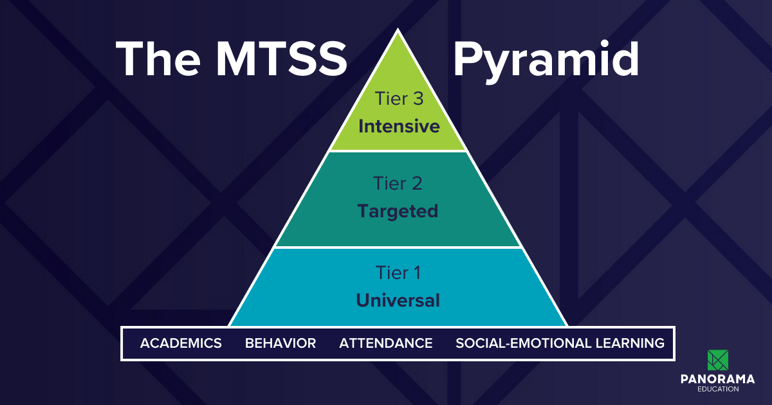
A depiction of the MTSS pyramid
Tier 1 supports and school-wide expectations set students up for success from the beginning. A healthy Tier 1 should include:
- High-quality academic core instruction
- Social-emotional learning in curriculum and assessment
- Strong student and teacher relationships
- Systems to promote positive behavior
- Equitable and inclusive school climate
Educators can use Tier 1 interventions in support of these key pieces. Ensure implementation across your district by equipping your educators with the tools and strategies they need.
- Encourage MTSS teams to build and share intervention menus with teachers at their schools.
- Find ways to regularly share resources with your educators.
- Make space to discuss interventions at staff meetings.
- Provide ongoing professional learning opportunities around MTSS and interventions.
Recommended Resource: 42 MTSS Intervention Strategies for Your Student Support Team
|
|
6. Gather Regular Feedback for Continuous Improvement
MTSS implementation is not a one-time event, but rather an ever-evolving system. As student needs, district priorities, and state and federal regulations shift and change, so will your MTSS. Practices or interventions that worked when you first started may no longer be successful several years later, and that is okay. An MTSS progresses through a commitment to continuous improvement.
Gather feedback from your educators about the state of your district’s MTSS. Here are some examples of questions you can ask to get a clearer understanding of your current MTSS implementation:
- How clear is your school or district's vision for MTSS?
- How clear are decision-making processes for assigning students to Tier 2 and Tier 3 supports?
- How much time do staff have to monitor individual student progress?
- How effective has training been so far on what MTSS is and why it’s important for students?
Recommended Resource: MTSS Self-Assessment
What are the Benefits of Implementing MTSS?
Implementing a Multi-Tiered System of Supports (MTSS) in school districts offers numerous benefits, helping to create a more inclusive and effective educational environment. Now that we know the steps involved to implement, knowing the benefits can help paint the full picture of how important MTSS can be in schools. Here are just some of the benefits of implementing MTSS.
Early Identification and Support:
MTSS emphasizes early identification of students who need academic or behavioral support. This proactive approach helps address issues before they become more significant, leading to better outcomes for students.
Differentiated Instruction
MTSS provides a framework for differentiating instruction to meet the diverse needs of all students. Through its tiered approach, it offers varying levels of support, ensuring that students receive the appropriate interventions based on their needs.
Data-Driven Decision-Making
MTSS relies on continuous data collection and analysis to monitor student progress. This data-driven approach allows for timely adjustments to interventions, ensuring that they are effective and responsive to students’ needs.
Professional Development for Educators
Implementing MTSS often involves training and professional development for educators. This ongoing learning helps teachers and staff stay informed about best practices in instruction and intervention.
MTSS is beneficial to all facets of a district, and when implemented properly, can dramatically change district outcomes.
MTSS Implementation: What Comes Next?
Implementing a strong MTSS is no small feat, and requires committed leadership, clear vision, and, most importantly, a plan. No matter where you are with your implementation of MTSS, you can use these six keys as a guide to help keep you on track, and determine what comes next.
You can further support your district’s MTSS implementation by ensuring you educators have the tools they need to shift their mindsets around new and changing systems. Giving adults opportunities to develop their own social-emotional learning can help create a positive school culture and keep everyone working towards the common goal: implementing an MTSS that supports students at every level.
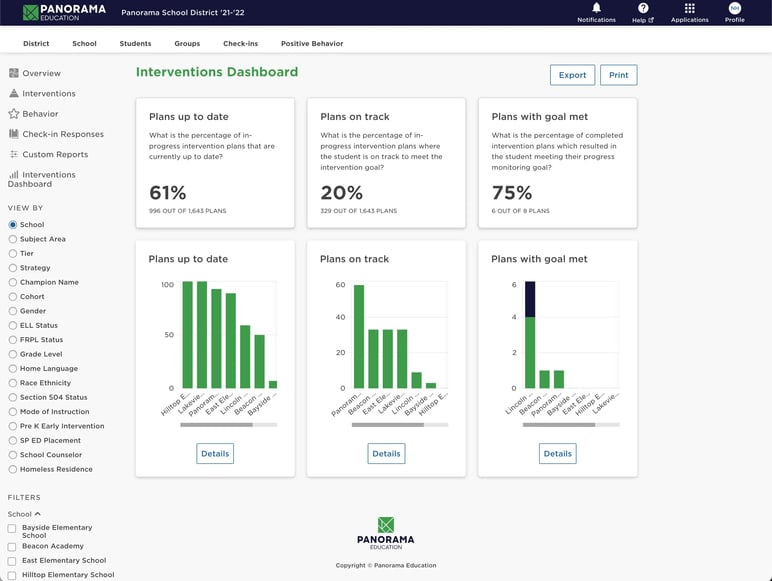
Panorama's MTSS Dashboard gives a high-level view of intervention plan progress across the district (demo data shown).
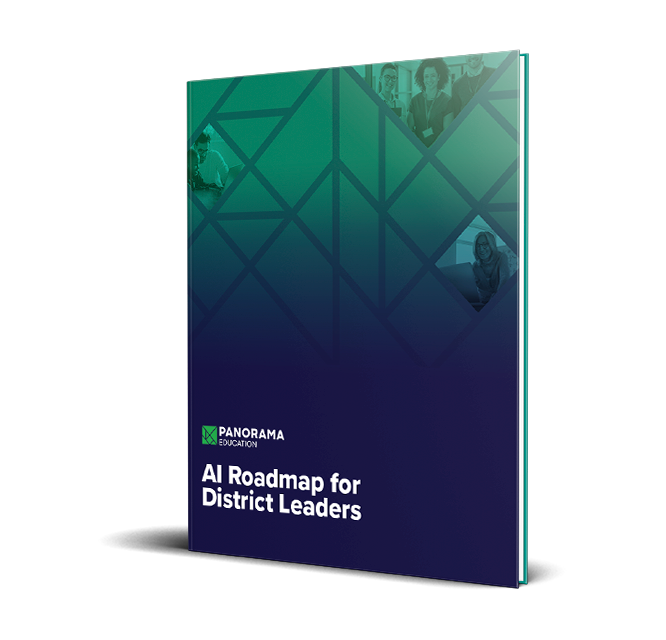
.jpeg)

